Tachyon tidbits featuring James Morrow, Ellen Klages, Gordon Van Gelder, and Nancy Kress
The latest reviews and mentions of Tachyon titles and authors from around the web.

James Morrow, Ellen Klages (photo: Scott R. Kline), Gordon Van Gelder (Houari Boumedienne), and Nancy Kress (Ellen Datlow).
For FANTASY LITERATURE, Bill Capossere praises James Morrow’s THE ASYLUM OF DR. CALIGARI.

If it sounds a bit over the top, well, it is. Morrow dives fully into gothic/surreal mode here, having fun with it even as he shows himself quite accomplished in its voice and tropes: the twisting, canted architecture; the purple and at times stilted prose; use of fire and shadow, classic types such as the mesmerist and sorcerer, and so forth. This is all wedded to the historical events of the time, such as the assassination of the Arch-Duke, the rolling in of one country after another due to alliances, specific military actions and strategy, and the use of new weapons such as the flamethrower and the early tank. Morrow also raises the intellectual stakes with explorations of art’s power (or lack thereof) to affect human action, psychology, violence, propaganda, war profiteering, sexuality, the gross absurdity of warfare — either individually or as they are entwined in culture/human nature.
If you’ve seen the film or know a lot of early 20th Century/late 19th Century art, Morrow offers up a slew of allusions for you to revel in. If not, the book is still enjoyable for its prose style, big ideas, and especially for its humor. THE ASYLUM OF DR. CALIGARI is peppered with lots of one-liners or funny dialogue bits. Not all the humor worked, and some would have stood better with a bit more subtlety (the line “Rube descending a staircase” would have been even funnier without the explanation just before of the painting itself. I thought), but I laughed aloud a few times and chuckled many more. I’d offer up examples but don’t want to spoil the jokes (Freud and Nietzsche makes especially ripe targets here, though).
I did think THE ASYLUM OF DR. CALIGARI felt too long even though it comes in at just about 200 pages and would have preferred it as a long short story/short novella, maybe about 130-150 pages or so. But for such a short book this is a relatively minor complaint since the length of time to finish it was so minimal, making this an easy recommendation despite that one issue.
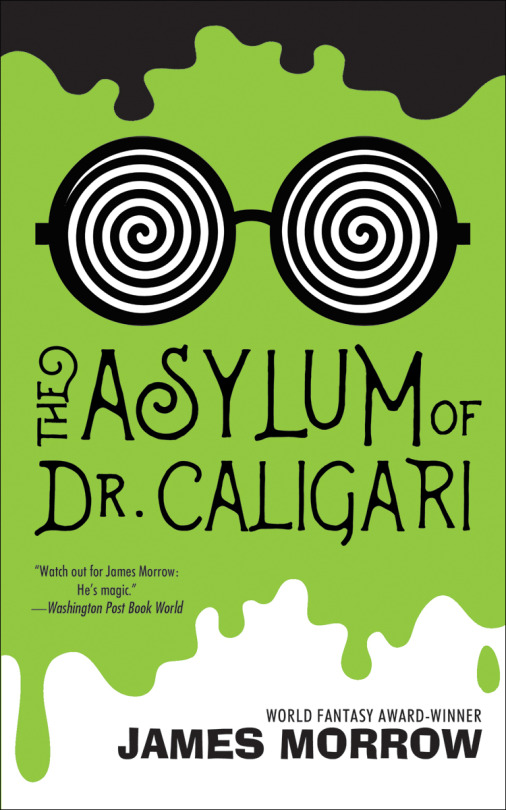
At KIRKUS, John DeNardo recommends Ellen Klages’ WICKED WONDERS in his article 3 Lies and 7 Truths About Reading Short Fiction.
Pssst! Can I ask you a question? We’ve known each other for a while now, and I feel like we’ve established a relationship where we can drop the pretenses and be honest with each other. There’s something I’ve been meaning to ask you, and I don’t know the best way, so I’m just going to come right out and ask: why don’t you read short fiction?
If I’ve misread you, I’m sorry. If you love reading short fiction like I do, then I’m glad we found some common ground on which we can share our mutual love of reading. But if I’ve read you correctly, then…we need to talk. If you’re intentionally avoiding short fiction then you’re cheating yourself out of some fantastic reading experiences. Here, let me break it down for you…
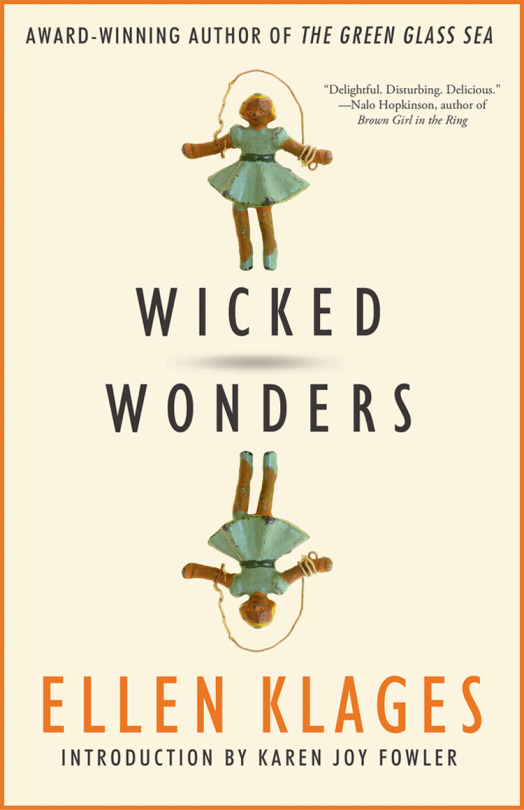
WICKED WONDERS and Klages’ PASSING STRANGE appeared on the Borderlands June bestsellers list.
Trade Paperbacks
1. THE THREE-BODY PROBLEM by Cixin Liu, trans by Ken Liu
2. ALL THE BIRDS IN THE SKY by Charlie Jane Anders
3. THE RAVEN STRATAGEM by Yoon Ha Lee
4. PASSING STRANGE by Ellen Klages
5. THE GIRL WITH ALL THE GIFTS by M.R. Carey
6. TOO LIKE THE LIGHTNING by Ada Palmer
7. WICKED WONDERS by Ellen Klages
8. PREY OF GODS by Nicky Drayden
9. I AM NOT A SERIAL KILLER by Dan Wells
10. RIVER OF TEETH by Sarah Gailey
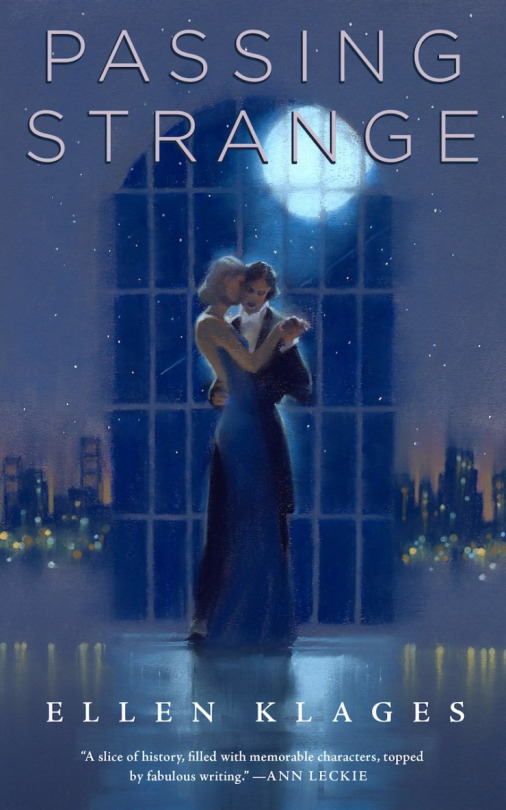
LOOKING FOR A GOOD BOOK enjoys Gordon Van Gelder’s THE VERY BEST OF FANTASY & SCIENCE FICTION, VOLUME 2.
But more often than not I was impressed by the stories …only a small handful that I remember reading back in the late 1970’s/early 1980’s when I subscribed to the magazine: “Jeffty is Five” by Harlan Ellison is such a story, as is George Alec Effinger’s “The Aliens Who Knew, I Mean, Everything.” Ellison’s work was always cutting edge and ‘Jeffty’ is one of the classics that continues to stand the test of time. Effinger is someone who’s work I saw a lot of at the time but who doesn’t have the following that he should. This is a great way to introduce him to new readers.
I stopped reading F&SF in the 1980’s – not because I wasn’t interested, but …well…life happens sometimes. My point, though, is that the writers here that appeared in the magazine after the 1980’s are authors who are ‘new’ to me (though I’ve recently become acquainted with those still publishing). I enjoyed Charles de Lint’s “The Bone Woman” and Maureen F. McHugh’s “The Lincoln Train” – an alternative history story.
“Maneki Neko” is by Bruce Sterling – one of my favorite ‘new’ authors (though he’s pretty established now) and this story shows his deft hand. He’s known as one of the leaders of the ‘cyber-punk’ category and here he combines his noted cyberpunk skills with humor. A fun story, and it’s these fun stories that always made me appreciate Fantasy and Science Fiction.
<snip>
Looking for a good book? THE VERY BEST OF FANTASY & SCIENCE FICTION, VOLUME 2, edited by Gordon van Gelder is a book that can’t help but appeal to anyone who already loves the genre and is a great way to introduce great science fiction and fantasy to new readers.
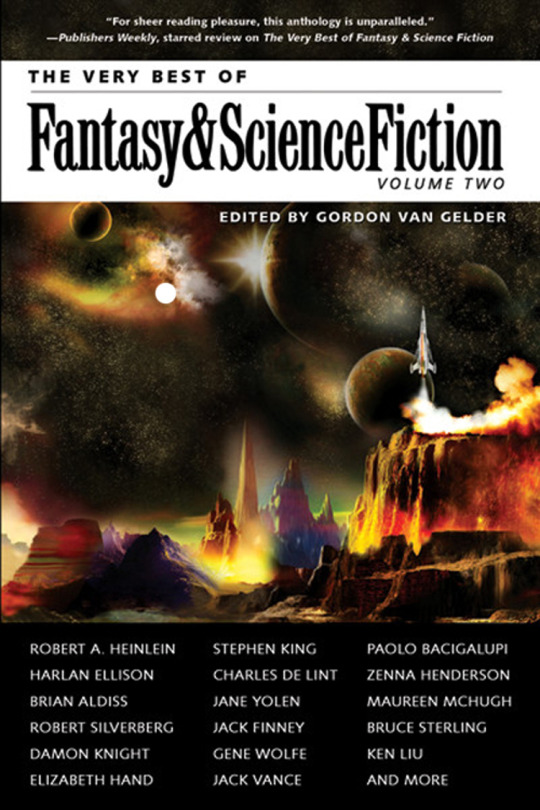
Paul Semel on his eponymous site interviews Nancy Kress.
While some novels start out as short stories or novellas, the switch typically happens as these tales are being written. No one ever gets to read the original short story or novella, and a completed version of the story may not even exist in this form. But Nancy Kress’ new sci-fi series, which kicks off with the novel TOMORROW’S KIN (hardcover, digital), has taken a different path. It started off as a novella, YESTERDAY’S KIN, which not only came out three years ago, but it’s still available wherever you buy fine books. Or fun ones. Though in talking to Kress about this, she admitted that this wasn’t part of some master plan three years in the making.
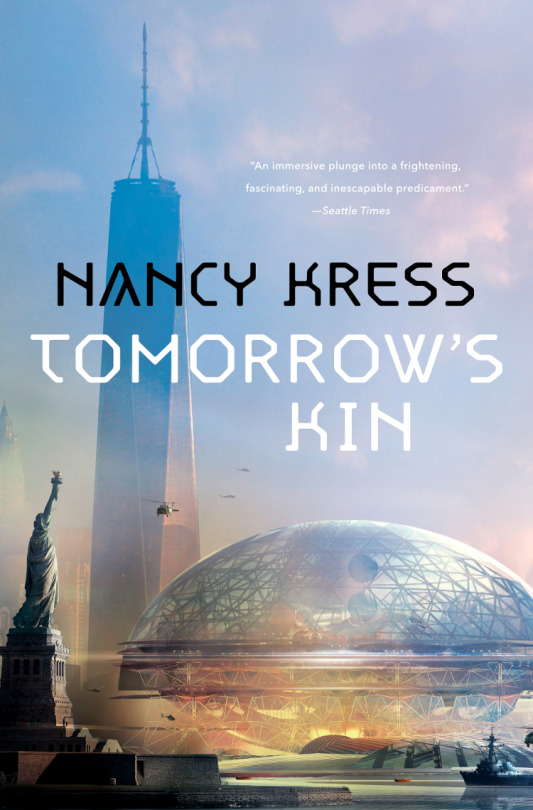
Where did the original idea for TOMORROW’S KIN come from, and how different is the finished novel from that original idea? Because my understanding is that it’s somewhat rooted in your 2014 novella, YESTERDAY’S KIN.
The novella forms the first quarter of the novel, which extends the story ten more years. There was still a lot of story still to be told, what with global disruption on several levels as well as the new physics and engineering gifted by the aliens, which could lead to the building of the first Terran starships. Maybe. If all goes well. In fact, there is so much more story that it became a trilogy. All three books are written — TOMORROW’S KIN, IF TOMORROW COMES, and TERRAN TOMORROW — and will be released by Tor over time.
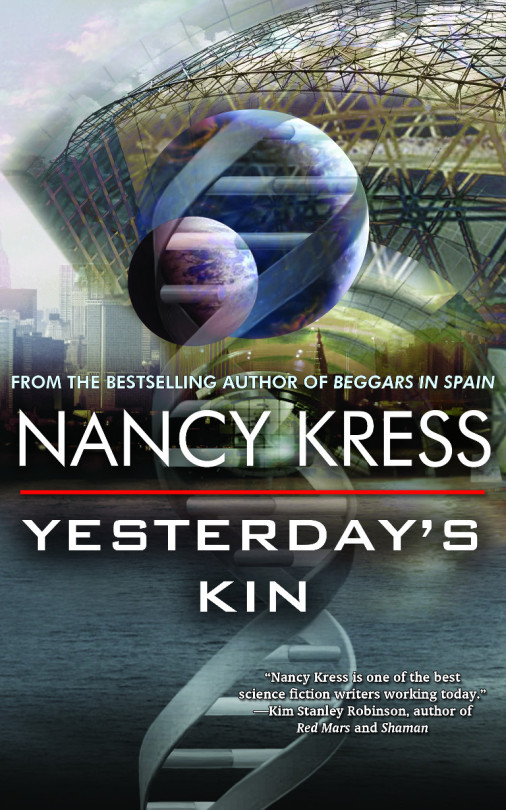
What was it about the the story you told in YESTERDAY’S KIN that made you think it could work over the course of three books, and why didn’t you write it that way to begin with?
The novel is not an expansion, which just tells a story in greater detail and ends in the same place. It’s an extension, which carries the story forward and ends in a different place. Big difference. I didn’t initially write a novel instead of a novella because I didn’t realize there was more story to tell until I’d finished the novella and thought about it for a while. I am not a great planner. I write, in part, to discover what I want to have happen, and then make decisions from there.
’
TOMORROW’S KIN starts off with the novella. It then picks up the story a year or so later and carries it through, with all the same characters, for nine more years. The next two books, due to marvels of time dilation while traveling between stars, covers a few more months for the traveling characters and nearly thirty years on Earth.
For more info on THE ASYLUM OF DR. CALIGARI, visit the Tachyon page.
Cover by Elizabeth Story
For more info on WICKED WONDERS, visit the Tachyon page.
Cover design by Elizabeth Story
For more info on THE VERY BEST OF FANTASY & SCIENCE FICTION, VOLUME 2, visit the Tachyon page.
Cover by Thomas Canty
For more info on YESTERDAY’S KIN, visit the Tachyon page.
Cover by Thomas Canty
